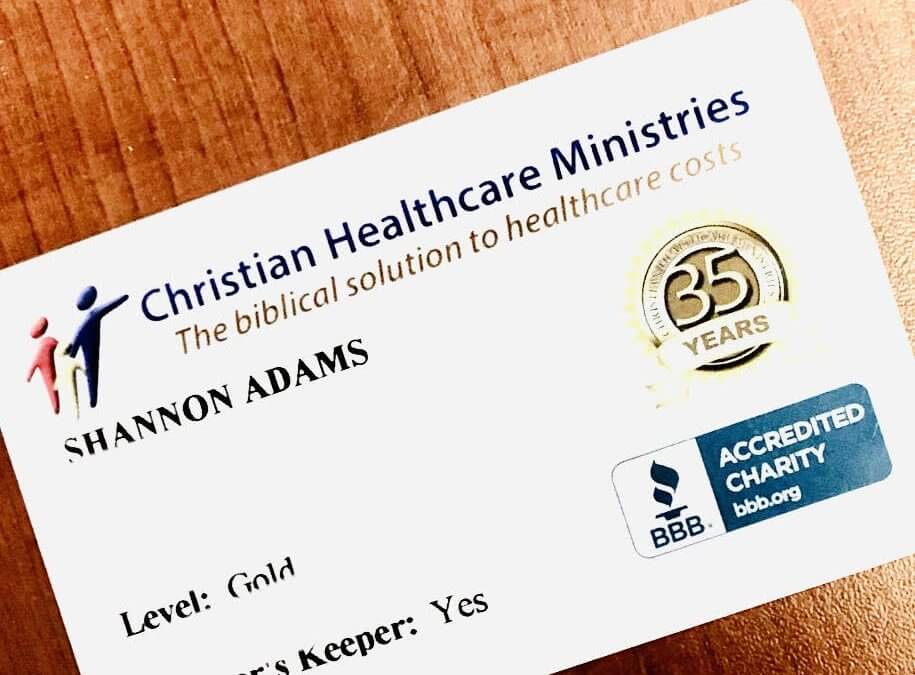The Chiropractor and I attended a county business meeting recently. We were there to learn about some zoning issues that might affect us at our property. Well, we found out that the zoning meeting had happened the night before, and instead we ended up hearing an hour-plus long pitch to the board of commissioners about a proposal for new benefits for the county employees.
As I was considering what my next blog post would be, it became clear as day–my experience with traditional health insurance versus a healthcare sharing ministry.
The pitch about benefits that we heard was primarily focused on healthcare coverage and it got a bit intense. There was a lot of talk and questioning around deductibles, premiums, and prescriptions. I was taken back momentarily to the town hall-style meetings I would sit in on at the hospital where I previously worked. As a full-time employee supporting myself and living far from family, I was very invested in understanding what our health plan options were, so I attended those meetings, took notes, and made my decisions feeling semi-informed.
It always felt like a heavy, critical decision when a change in plans came out and I had to weigh everything again. But at least I had health insurance, right? (Forget paying for rent, gas, food, or actually being fulfilled and motivated by your work–being employed full-time was mostly about the health insurance. The fact that I loved my work was just a bonus…) This may seem to set the stage for an extremist point of view, and I don’t mean for it to, but the world I lived in revolved around what your health insurance plan was when it came to the options you had to seek help with anything. Even if I could afford to pay out of pocket for a service or provider that wasn’t covered, my mindset was that it wasn’t an option because it wasn’t in the policy.
Most of this time period in my life was either post-Brandt or pre-Brandt (we had a few years off and someday I’ll share the juicy details about how I became his second wife when I could have been his first…). But suffice it to say, as many of my experiences with The Chiropractor and his subsequent influence on me were yet to unfold, I was operating in the traditional, mainstream model of western medicine. This meant utilizing and being grateful for health insurance. Natural or holistic options were far away (and the concept of a cash-based medical practice–yes they exist–was absurd).
I am here now to say that there IS life beyond employer-based health insurance!!
Let me insert an important disclaimer here: Traditional healthcare/modern medicine absolutely has its merits, and these services typically have a strong tie to traditional insurance plans. Trauma care, organ transplants, and care for complex genetic conditions are among some of the greatest blessings that modern medicine has brought us in my opinion. I wouldn’t trade my time working as a music therapist in those units for anything–many sacred moments were had in those patient rooms and I feel so blessed to have been among the healthcare team in a small way, and even more blessed by the amazing patients and families I got to know and work with. So please don’t misunderstand my comments to mean that I am opposed to the benefits and miracles of modern medicine. I am so grateful these services are here and available. And even though I may have my qualms with various policies, I love being able to continue to work in this hospital environment.
However, I do feel that life circumstances have helped me gain my own unique perspective. When The Chiropractor and I married and shortly thereafter it became apparent that we would be moving away from Texas so that he could take over his brother’s practice (see this post for those details if you don’t know the story), I became a little unsettled about leaving my work and not having health insurance. The position I had secured in Atlanta was PRN, which was perfect at that time, except that it meant no benefits.
The Chiropractor suggested I reach out to one of his cousins who was also married to a chiropractor, and who was having success with membership in a sharing ministry for health costs. This is when my eyes opened to the world of sharing ministries. I had never even heard of this model, and there was a ton to research. I spent weeks researching some of the biggest ministries and comparing the differences.
Here’s the basic gist if you’re not familiar with the model: a healthcare sharing ministry is an organization–NOT insurance, though ours did comply with Obamacare requirements–that is organized to help cover your healthcare costs. There are many different models within this general model of sharing ministries, and none of it is tied to your employment. You pay a certain amount, basically a membership fee, and then when you incur covered costs, you have help in paying.
Our particular ministry operates like this: 1) We pay a monthly membership/’sharing” fee as well as an optional quarterly amount for a certain level of increased coverage. There are three main tiers you can enroll at–I am at the gold level while The Chiropractor has the bronze. 2) When we have a covered bill, we pay upfront and ask for whatever self-pay/cash discounts are available, or arrange a payment plan. 3) We submit the required paperwork to the ministry and wait patiently. This is where you do have to be a little organized. If you’re not good with keeping track of itemized bills this might not be the best ministry to join–but there are other ways it’s done in other ministries. 4) We receive a check in the mail 2-3 months later for the covered expenses.
My membership level means that if I incur any costs that total over $500 for a new health incident, then 100% of the costs related to that issue are reimbursed–doctor visits, hospitalizations, prescriptions, imaging procedures, physical therapy, etc. The Chiropractor has a much higher level to exceed before his costs would be “shared,” but we honestly view his coverage more as catastrophic since it would have to be extreme for him to seek treatment anyway…
Without boring you with too many details, I’ll just tell you that I’ve used this process twice with perfect success–once for my silly frozen shoulder issue and everything that came with that, and once for another procedure I had. I was surprised when I did the math and discovered that our membership in this ministry actually saved us money, since we initially joined out of mild panic with a need to just feel covered by something. If I had had my 2017 surgery done with my traditional employer-based insurance, I would have had a $6,000 deductible to meet, and would have been limited to in-network providers. I ended up being reimbursed for 100% of it. We utilized savings to pay for it all until the reimbursement check came a couple months after all the paperwork was in (I recommend that system if its feasible), but we could have set up payment plans that would have required less upfront, too. Same thing with the shoulder issue.
Costs recently increased in our ministry, but for the first few years were were paying a combined $195 a month for this coverage. And even though that monthly membership payment was slightly higher than what my old premium had been (that covered just me), the overall savings still were several thousand dollars. They recently bumped our monthly payment up to $250 and I’m convinced the potential savings are still significant.
It does take a little bit of diligence in obtaining and submitting itemized bills, but that’s about the worst of it. And it’s probably important for me to mention that our particular plan does not cover preventative care or chiropractic. Lucky for me I’m married to someone who can help with that, and we just budget for the annual visits. I love it.
So there you go. If you find yourself in a situation where traditional employer-based insurance isn’t a good option, or an option at all, I would strongly suggest you take the time to research healthcare sharing ministries and consider if one of them might be a good fit. It may or may not be the best route to go for you and your family, but I’d say it’s at least worth understanding what’s out there, because you might find something that’s very do-able and will end up being a huge blessing. The one we’re apart of is called Christian Healthcare Ministries, but I’d recommend researching the others too because there are some differences that could be impactful in your decision.
If you end up choosing the same ministry that we did and don’t have chiropractic coverage, shoot me a message and I’ll connect you with a great one who has deep cash discounts AND who may even be able to offer some help in minimizing the need for other types of office visits. (Seriously, he can help you build your immune system not only through adjustments but through individualized supplements and nutrition recommendations.) Between this built-in resource that I have access to 24/7 and the sharing ministry, any anxiety I felt about leaving traditional insurance has melted away and I know I’m in good hands.


 I'm a BYU music ed grad who went on to become a pediatric music therapist in Texas, where I met and married my chiropractor husband (with a whole lot happening in between). While I can barely differentiate between an occiput and a sacrum and really have no business being on a chiropractic website, I can tell you that everything you read here will be based on my real life experience of being married to Brandt. From endless discussions about gut health to encouragement to try barefoot running to his own fast lasting five days--it's a great, kind of weird, life--and one I wouldn't trade for anything.
I'm a BYU music ed grad who went on to become a pediatric music therapist in Texas, where I met and married my chiropractor husband (with a whole lot happening in between). While I can barely differentiate between an occiput and a sacrum and really have no business being on a chiropractic website, I can tell you that everything you read here will be based on my real life experience of being married to Brandt. From endless discussions about gut health to encouragement to try barefoot running to his own fast lasting five days--it's a great, kind of weird, life--and one I wouldn't trade for anything.